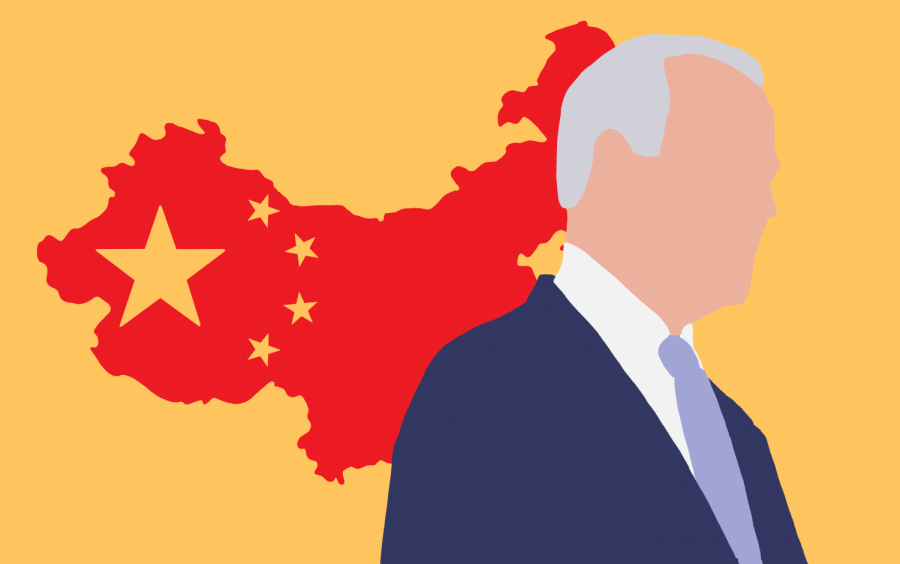Tough on China: A continuation of Trump-era policies
February 12, 2021
Over the past few years Chinese influence across the globe has increased, threatening U.S. power across the globe. To counteract this rise, the Biden administration must take strong measures to curb China’s growing economic and military power.
Former president Donald Trump started his Indo-Pacific strategy with goals of promoting economic growth and expanding diplomatic relations between countries within the region This would allow the United States, instead of China, to be the main superpower in the Pacific.
On Jan. 26, the Senate confirmed former Deputy Secretary of State Antony Blinken to lead the State Department under Biden. Blinken spoke on a variety of issues from restoring faith in European allies to the Yemen humanitarian crisis and the Iran nuclear deal. Most importantly, he discussed how he would deal with China diplomatically.
“I disagree, very much, with the way that [Trump] went about it in a number of areas, but the basic principle was the right one,” Blinken said “And I think that’s actually helpful to our foreign policy.”
In terms of economics, the most memorable of Trump’s actions against China was his trade war that began in July of 2018 with the implementation of tariffs against Chinese goods.
Although the initial goal of these tariffs was to curb the unfair trading practices of China, the trade war led to an increase in consumer goods for Americans, costing about 57 billion dollars annually. Additionally, this tariff did little to hurt China’s economy, which instead grew by 2.3% in 2020.
News from the Biden administration shows that this trade war is not going to end as any hope of continuing to stop Chinese influence requires the United States to prevent its economic growth.
The coronavirus pandemic, though damaging world trade, gave China an economic advantage over the United States, causing the U.S. economy to stagnate while China’s flourished. Unless Biden can find ways to further reduce China’s economy or bolster the U.S.’s own, it must take other steps to stop their expansion.
China has begun their belt and road initiative, with the goal to invest in the infrastructure of countries in Africa, the Middle East and South America. The investment in countries such as Pakistan, Ecuador and Sudan appears selfless, but there are benefits to China for doing this.
The debt these major oil exporters now owe China puts China in strategic control of their economies. Pakistan is the greatest concern as China was able to build its Gwadar Port allowing it access to the Indian Ocean, increasing Beijing’s influence in the area.
Meanwhile, U.S. investments have increased by over $150 billion dollars from 2018 to 2019, but increase is only for U.S. allies like Japan and the United Kingdom. Although helping allies bolsters U.S. interest we should instead be focus on creating new allies by investing in other foreign countries. The sole change the Biden administration has made so far to foreign aid was ending a policy that prevented it from being used for abortion. If this is the only change made, the United States has let China succeed.
The United States is the arsenal of democracy defending nations from authoritarian powers; and we must continue to defend allies in the South China Sea from Chinese military endeavours. China has been rapidly bolstering its navy, and even though their production level can not be maintained for long, their aggressive expansion is worrying.
The South China Sea is a major shipping area with billions of dollars worth of goods traveling through yearly. Should any nation control it, they would have great influence over the economies of nations located in the area.
Trump’s America First policies put the defense of military bases and defense treaties with multiple countries in the Pacific in jeopardy. His constant fighting with allies such as South Korea over paying for military bases risked the security of the region. Threatening to remove U.S. soldiers from these strategic positions would allow China to expand its military strength throughout the region uncontested.
Although how exactly Biden plans to tackle this military threat is still unknown, his campaign emphasized its goal to ensure U.S. military superiority; but this plan is at odds with his goal of reducing overseas missions.
China’s volatile nature in the South China Sea means that the U.S. will have to be more aggressive in its combating of Chinese military ambitions in the area. To accommodate for this aggressive approach, it would require Biden to implement a costly 2021 military budget.
China’s current course of increasing influence threatens to destabilize the rest of the world, including the United States. The Biden administration must continue to be diligent in preventing China from expanding any further.
“We have to start by approaching China from a position of strength, not weakness,” Blinken said. “The good news is, our ability to do that is largely within our control.”

























































